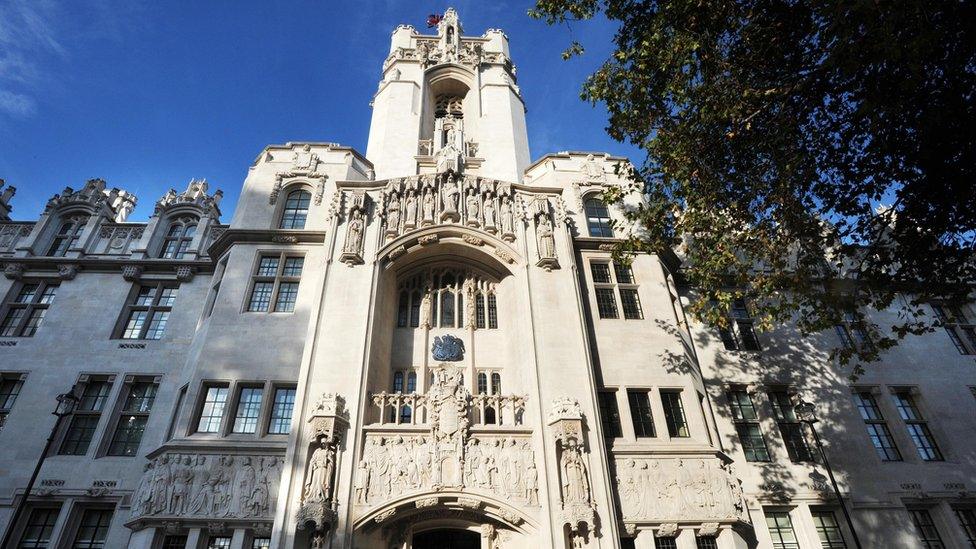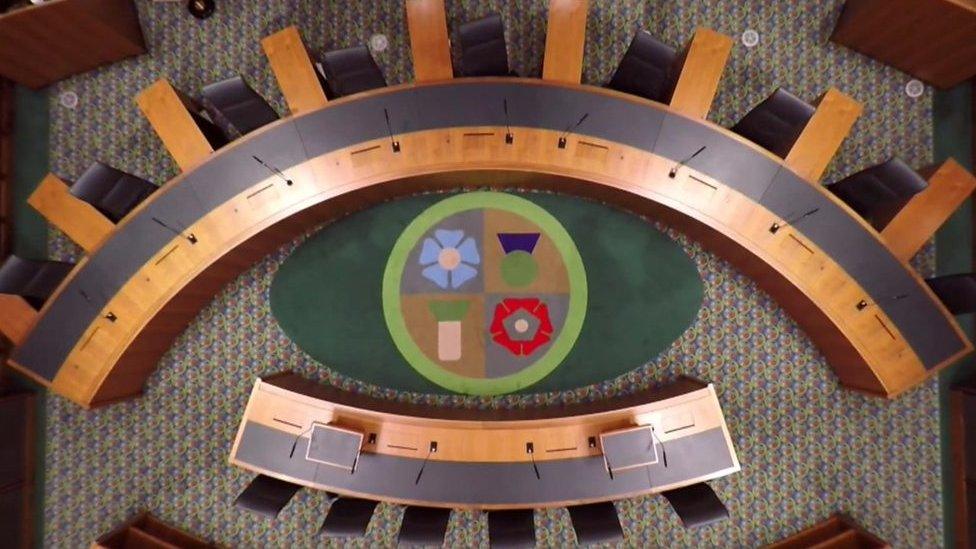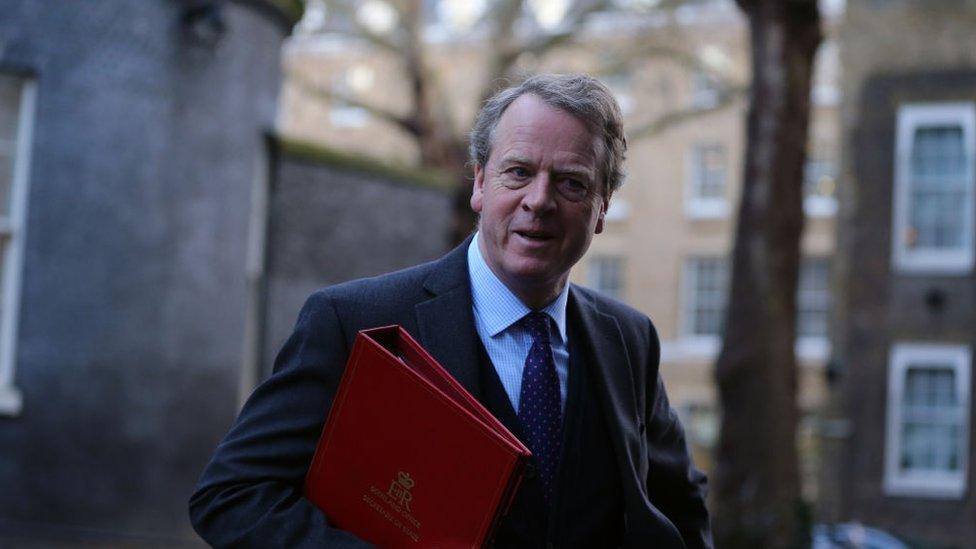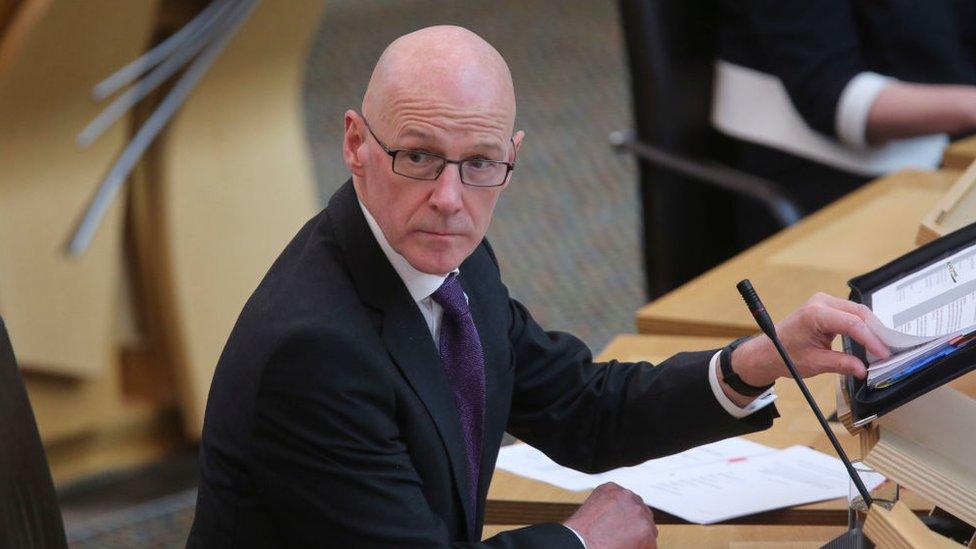Supreme Court considers UK challenge to two Holyrood bills
- Published

Judges will hear two days of arguments about the extent of Holyrood's powers
Supreme Court judges are considering whether two bills passed by MSPs are within Holyrood's powers after a legal challenge from the UK government.
The bills, which concern local government and children's rights, were unanimously agreed by MSPs in March.
However they were challenged by UK law officers, who say they could place obligations on UK ministers.
A panel of judges at the Supreme Court in London heard two days of arguments about the case on Monday and Tuesday.
The Welsh government was also represented in the case as a respondent, with wider questions about devolved powers at stake.
What are the bills involved?
The two bills have a similar purpose - to incorporate aspects of international treaties which the UK has signed up to into Scots law.
The first is the United Nations Convention on the Rights of the Child (Incorporation) (Scotland) Bill.
It was introduced by the Scottish government, aiming to set a legal requirement for public authorities to comply with certain standards on children's rights - and giving Scottish courts the power to decide if legislation is compatible with them.
Only a small number of countries have incorporated the convention into domestic law, and Scotland would have been the first part of the UK to do so.
The second is the European Charter of Local Self-Government (Incorporation) (Scotland) Bill, drawn up by independent MSP Andy Wightman - who lost his seat in May's election.
Neither bill proved particularly controversial at Holyrood, and both were passed unanimously by MSPs. However the UK government raised concerns about them, and after the final votes submitted a challenge to the Supreme Court - meaning the legislation cannot become law until the row is settled.

Legislative disputes between the Scottish and UK governments are heard in the Supreme Court in London - although in this case, virtually
What is the UK government's complaint?
UK law officers insist they have no issue with the substance of the legislation, either on the topic of children's rights - which ministers say they are "deeply committed to protecting" - or local government.
The UK signed up to both of the treaties in question in the 1990s, but has never directly written them into domestic law.
However UK ministers are concerned that the standards set by the bills could also be applied to Westminster legislation - thus placing legal obligations on the way UK minsters act in reserved areas, something MSPs are not permitted to do.
Their submission to the Supreme Court said that both bills would "bestow upon the Scottish courts extensive powers to interpret and scrutinise primary legislation passed by the sovereign UK parliament".
Scottish Secretary Alister Jack said: "The UK government respects the Scottish government's right to legislate on this matter in line with its responsibilities under the devolution settlement. What it cannot do is seek to make provision that constrains the UK parliament's ability to make laws for Scotland."

Alister Jack wrote to the Scottish government asking for one of the bills to be amended
What is the Scottish government response?
Scottish ministers have pushed back in particular over the UN convention bill, but are defending both in court.
After the legal challenge was announced - during the Holyrood election campaign - First Minister Nicola Sturgeon said the move was "politically catastrophic and morally repugnant".
This echoed comments from her deputy, John Swinney, who told MSPs during the final debate on the UN convention bill that the UK government's request that it be amended amounted to a "orchestrated and sustained assault" on Holyrood's powers.
He said the Scottish government's approach to the bill had been deliberately "maximalist", and that ministers wanted to "do all that we could within our legislative competence to protect the rights of children and young people".
And he said that stripping provisions from the bill would "limit the protections available for children and young people".

John Swinney said the provisions of the UN convention bill had been drawn deliberately wide
What happened in court?
A panel of five judges - Lord Reed, Lord Hodge, Lord Lloyd-Jones, Lord Sales, and Lord Stephens - heard arguments from lawyers representing the Scottish and UK governments about whether the legislation falls within Holyrood's competence.
Proceedings took place via video conference due to the Covid-19 pandemic, with two full days of arguments made.
The UK government side went first, on Monday, arguing that Westminster parliament remains sovereign and should be able to make laws for Scotland.
The Scottish government was joined in responding by the Welsh government, which has an interest in where the lines of responsibility are drawn between Westminster and the devolved administrations.
The governments clashed in the same court over Holyrood's powers in 2018, when the Scottish government put forward its own Brexit legislation.
On that occasion, then-Presiding Officer Ken Macintosh had made clear that he did not think the bill was within Holyrood's remit.
However he gave his backing to both pieces of legislation now in question, having provided formal statements to MSPs saying they were "within the legislative competence of the Scottish Parliament".
The judges said they would return a judgement as soon as possible.
This will determine whether the bills can go ahead and become law - or if they may have to come back to Holyrood to be amended.
- Published12 April 2021
